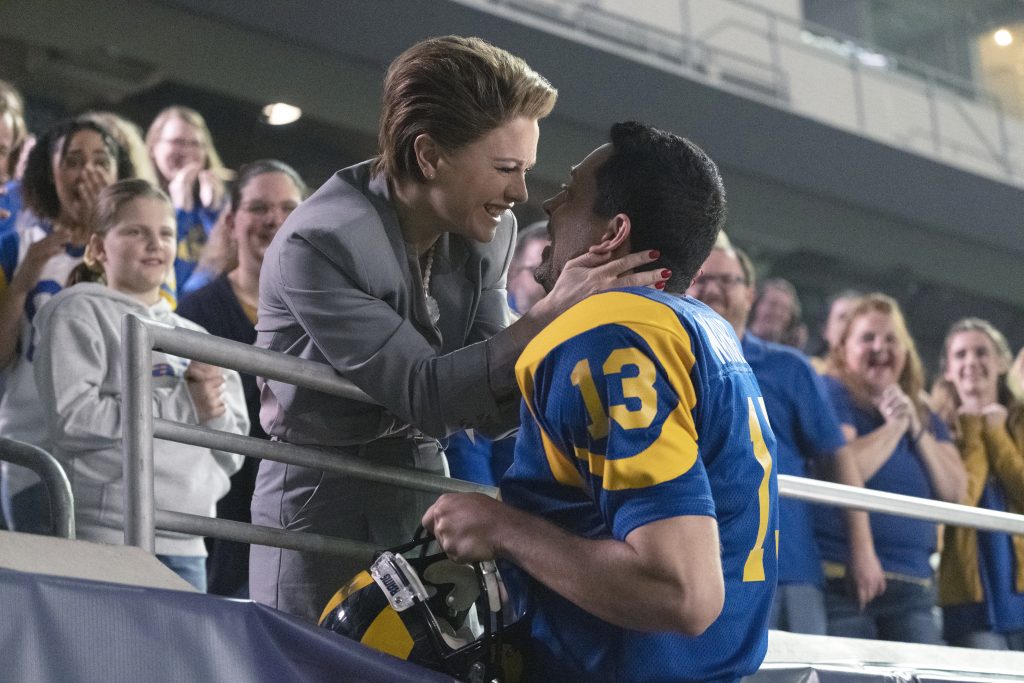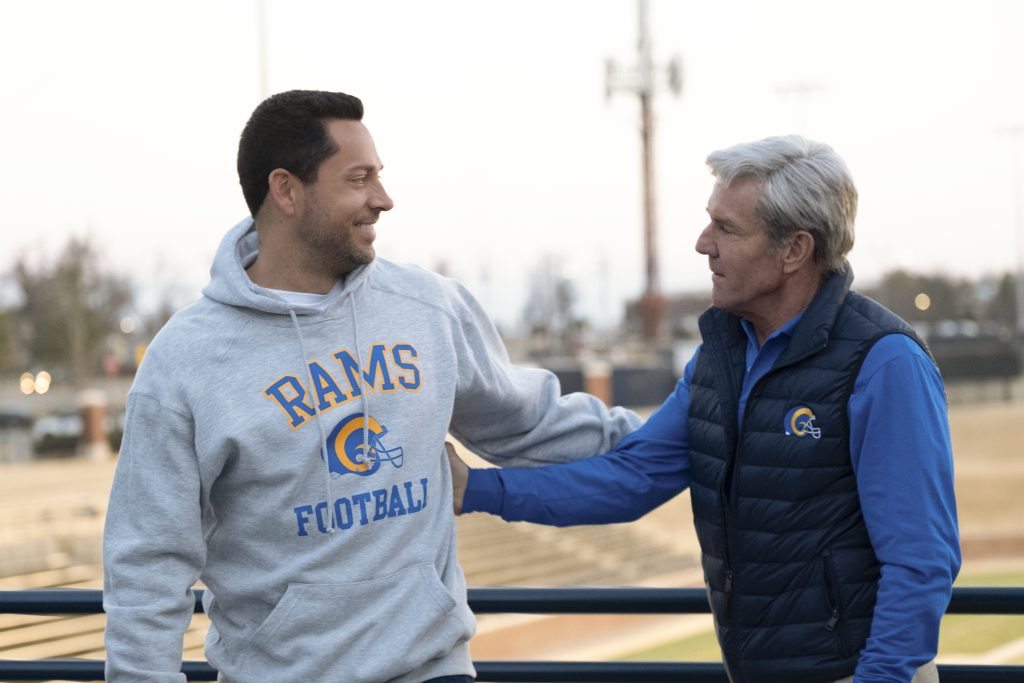March 10, 2023
by Carla Hay

Directed by Jeffrey A. Smith
Culture Representation: Taking place from the 1950s to the 1980s, primarily in Alabama and Florida, the faith-based dramatic film “Southern Gospel” (which is based on a true story) features a predominantly white cast of characters (with a few African Americans) representing the working-class and middle-class.
Culture Clash: A son of a pastor goes from being a religious kid to being a hedonistic rock musician to being a pastor, and he experiences a lot of tragedy and heartache along the way.
Culture Audience: “Southern Gospel” will appeal primarily to people who are interested in watching faith-based biopics that tell fascinating stories about overcoming a troubled pas, as long as viewers don’t expect top-notch filmmaking.

Many aspects of “Southern Gospel” are predictable, but solid performances from most of the cast members help overcome some clichés of faith-based films. This biopic of Dream Church founder Samuel Allen also benefits from having good original songs. It’s a reasonably entertaining film, as long as viewers don’t expect it to be the best faith-based movie they could ever see.
Written and directed by Jeffrey A. Smith, “Southern Gospel” takes place from the 1950s to the 1980s, mostly in Alabama and Florida. The movie is mostly told in chronological order, with occasional, brief flashbacks. Because the story takes place over several decades, the movie sometimes suffers from over-simplification of some heavy life issues. There are also large gaps in the story, which skips over certain periods in Samuel Allen’s life, such as when he struggled with his band to “make it” in the music business.
“Southern Gospel” begins in the mid-1950s, when Samuel (played by Beau Hart) is about 10 years old. He is the only child of a widower pastor named Joe Allen (played by Gary Weeks), who leads a small congregation of a fundamentalist Christian church in Alabama. Due to pregnancy complications, Samuel’s mother died while pregnant with Joe’s younger sibling, who also did not survive. Joe is a part-time pastor. His other job is as the owner of a small company called Allen’s Paper Hangers.
Samuel is a slightly rebellious child who is endlessly curious and asks a lot of questions. His curiosity irritates the teacher of his Sunday school—a stern nun named Sister Abernathie (played by Sharon Blackwood)—who is quick to scold Samuel if he dares do anything that she thinks is “sinful.” The people in Joe’s religious community and church are so strict, they don’t believe in swimming in public places, because they think wearing swimsuits could cause sexual arousal and is therefore is “sinful.” They also believe that rock music is the devil’s music.
Joe appears to be a very judgmental pastor in church. “God knows how to spot a fake!” he tells his congregation during a sermon. However, when Joe is at home, he’s much more relaxed about the church’s “rules.” For example, when Samuel and Joe are sitting together at a dining table at home, Samuel tells Joe that Sister Abernathie told Samuel will go to hell for cursing. Samuel asks Joe if it’s true. Joe replies by saying with a smile, “Sister Abernathie doesn’t know what the hell she’s talking about.”
Privately, Joe also doesn’t seem to mind too much that Samuel has an interest in rock music, as long as Samuel isn’t too public about it. At this young age, Samuel has shown talent for being a singer and a guitar player. Joe privately encourages Samuel to continue his passion for music: “You have a gift, son. It’s in your blood.”
Samuel’s best friend Barry Linkler (played by Kal-El White) is a big fan of Elvis Presley. Barry says about Presley: “That white boy’s got soul.” Barry tries to convince Samuel to go with him to see Presley perform at an upcoming concert, but Samuel says his pastor father would never let him go to the concert or publicly listen to rock music,
Barry and Samuel both have acoustic guitars, and the two friends practice playing their guitars together. Joe doesn’t seem to mind that either, because electric guitars are considered sinful due to electric guitars being mostly associated with rock music at the time. Barry happens to be African American, but there is no mention of his race or racial segregation at all in “Southern Gospel.” It’s a very unrealistic part of the movie, because the shameful practice of racial segregation was prevalent and legal in Alabama in the 1950s.
“Southern Gospel” establishes early on who will be the “villain” of the story. His name is T.L. Whittmore (played by Justice Leak), the church’s state overseer. T.L. is self-righteous, arrogant and vengeful against anyone whom he thinks is a “sinner” who cannot be redeemed. And you know what that means: He will become a nemesis to Samuel.
The movie then fast-forwards to Samuel (played by Max Ehrich) as a teenager in high school. He’s the lead singer/guitarist for a band, and he become fairly popular because of his talented performances at school assemblies and at local church gatherings. A classmate named Julie Ledbetter (played by Katelyn Nacon) has a big crush on Samuel, but she’s too shy to let him know. Julie has a secret that she eventually tells Samuel about: Her father William Ledbetter (played by William Gregory Lee) is an alcoholic who is physically and emotionally abusive to her.
Another classmate named Angie Blackburn (played by Emma Myers) is more outgoing and flirtatious with Samuel. Angie is the daughter of Dr. Wade Blackburn (played by Ric Reitz), a prominent medical doctor in the community. Angie invites Samuel to her family’s Fourth of July party. Dr. Blackburn, who is a religious conservative, is a little suspicious of Samuel because he thinks Samuel might be a “rock and roll” type of person. Without giving away too much information, a fatal tragedy happens, and Samuel is immediately and unfairly blamed for it.
The movie then abruptly cuts to the Fox Theatre in Atlanta in 1969. Samuel is a long-haired, drug-abusing musician in a rock band called Bama Wildfire. It’s a trio consisting of Samuel on lead vocals and guitar, Barry (played by J. Alphonse Nicholson) on bass, and a blonde hippie named James (played by Dylan Barnes) on drums. Before going on stage, Samuel takes a tab of LSD while he’s in the dressing room.
After the concert, James is smoking marijuana while driving the three of them in a car. Barry and Samuel are asleep or passed out from whatever substances they ingested. James nods off and drops the lit marijuana joint on the car floor, which catches on fire. The flames wake James up, but it’s too late. James crashes the car into a tree, and he’s trapped inside the flaming car.
Barry was in the front passenger seat, and the crash ejected him from the front window, but not without getting serious burns and cuts. Samuel was in the back seat, and he was able to get out from the car with no serious injuries. But James dies in this car wreck. And it’s another tragic and shocking death for someone close to Samuel, who is arrested because a lot of drugs were found in the car.
The rest of “Southern Gospel” shows Samuel’s journey on his path to redemption. Barry remains a close friend, but he is struggling with his own personal demons, as he becomes an alcoholic. Sometime after the car wreck, when Samuel is trying to turn his life around, he sees Julie performing in a church. They reconnect, start dating, get married, and have two children together. None of this is spoiler information, since it’s all in the “Southern Gospel” trailer.
However, the movie shows how Samuel, Julie and Barry deal with their personal traumas. And it’s a very rough road in many ways. Samuel also has to decide if he wants to continue being a full-time musician or become a pastor.
Throughout the 1970s, Samuel and Julie start performing Christian rock as a touring duo, because they don’t see anything wrong with rock music being performed in churches. It’s an idea that’s a little too radical for some fundamental Christians. Samuel and Julie get a lot of resistance and criticism for performing rock music, including from T.L., who’s still acting like he’s the overlord of everyone else’s morality.
The movie’s best-acted scenes are those that show the friendship of Samuel and Barry after that fatal car accident. There are some heartwarming and harrowing moments that truly show the highs and lows of this brother-like relationship. Nicholson and Ehrich are very convincing as longtime friends who share good times as well as painful memories.
The romance between Samuel and Julie is less convincing, as much of it looks like a fairy tale that’s sometimes marred by Julie being haunted by memories of her father’s abuse, and Samuel experiencing inner turmoil over his own personal problems. However, Ehrich capably handles portraying the myriad of emotions and life phases that Samuel goes through in the movie. Nacon is perfectly fine in her performance as Julie, which doesn’t require as many transformative qualities as the role of Samuel.
“Southern Gospel” writer/director Smith wrote several of the original songs that Ehrich (as Samuel) sings in the movie. Many of the songs aren’t award-worthy but they’re catchy and are well-placed in scenes where the musical performances enliven this occasionally dull film. “Southern Gospel” actually has very little gospel music and has mostly Christian rock/pop music.
The makeup and hairstyling for “Southern Gospel” fall short of excellence. Samuel and Julie still look like they’re in their 20s when they’re supposed to be in their 40s, while the wigs they wear in some scenes look terribly obvious. Those are minor flaws that don’t take too much away from “Southern Gospel,” which ends exactly the way that you think it will end in a movie about someone who founded a church after going through some rough and troubled times.
Iconic Events released “Southern Gospel” in select U.S. cinemas on March 10, 2023.


